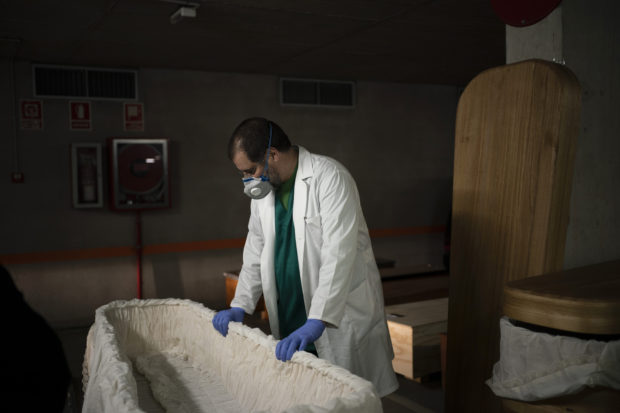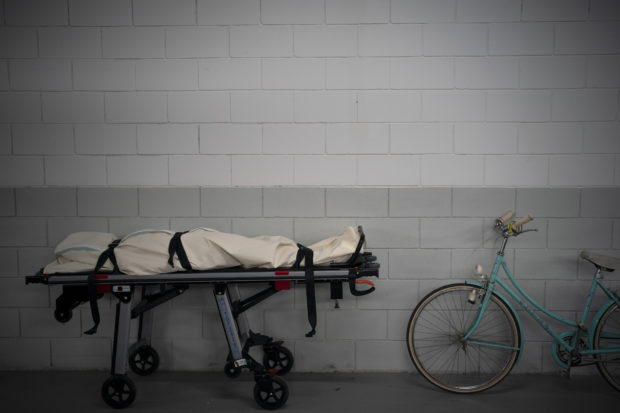Coffins in the parking lot: A Spanish funeral home copes
BARCELONA, Spain — Jordi Fernández’s 16-year-career as a mortician didn’t prepare him for the hundreds of bodies that are streaming into the Barcelona funeral home where he works.
Many are victims of COVID-19, and Fernandez cannot truly do his job.
As head thanatopractitioner, Fernández is usually tasked with preparing the corpses for their funerals, to disguise “the colors of death” and instead give the deceased an appearance of peace and tranquility.
But since a state of emergency was declared on March 14, funeral homes in Spain must follow strict measures to avoid further contagion, stripping Fernández of his normal duties and taking away the last chance families had of seeing their loved ones before laying them to rest.
Now, infected corpses cannot be removed from their sealed body bags and are placed straight into coffins, something Fernández and his team try to do with the utmost care.
“What I like to do is place their head on the pillow because that’s going to be forever,” he said as he choked up in tears. “It is a way to show some respect and give some affection, too.”
Article continues after this advertisement
In this April 14, 2020, photo, head mortician Jordi Fernandez prepares a coffin before placing the body of a COVID-19 victim in an underground parking garage turned into a morgue at the Collserola funeral home in Barcelona, Spain. Since a state of emergency was declared in the country, funeral homes must follow strict measures to avoid further contagion, stripping Fernandez of his normal duties and taking away the last chance families had of seeing their loved ones before laying them to rest. (AP Photo/Felipe Dana)
Fernández stood outside an underground parking garage-turned-morgue currently housing the bodies of over 500 victims either confirmed or suspected of dying from COVID-19.
Article continues after this advertisement“I had never imagined a situation like the one in which we are living,” he said.
The space run by the Mémora funeral home group has been equipped with air conditioning to preserve the dead as public cemeteries and crematoria struggle to keep up with the demand.
The virus has killed nearly 19,000 people in Spain, according to national health authorities who only count cases where the victims have tested positive for the virus. But funeral homes know all too well that the real number is likely much higher. Fernández says he’s seeing five times more bodies come in than normal.
On Wednesday evening health authorities in Catalonia released for the first time the number of virus deaths reported by funeral homes. According to those records, a total of 7,097 people had died from COVID-19 related causes in the northeastern region, nearly double the number of fatalities previously reported by Catalan officials who until now only included deaths in hospitals and nursing homes.
For most, the new coronavirus causes mild or moderate symptoms, such as fever and cough but for some, especially older adults and people with health problems, it can cause more severe illness and death. Over 137,000 people with the virus have died worldwide, according to a tally by Johns Hopkins University that health experts say undercounts the true toll of the pandemic.
Although authorities in Spain believe they have passed the peak of the contagion curve and began relaxing lockdown measures this week, there are still more bodies coming into the Barcelona garage morgue than are leaving.
The demand for cremations was so great in Barcelona that even with all four of the city’s ovens operating 24/7, officials considered the option of placing the dead in temporary plots.

In this April 14, 2020 photo, a body lays on a stretcher next to a bicycle before being prepared for cremation at a funeral home in Manresa, Barcelona province, Spain. Since a state of emergency was declared on March 14 in the country, funeral homes must follow strict measures to avoid further contagion. Now, infected corpses cannot be removed from their sealed body bags and are placed straight into coffins. (AP Photo/Felipe Dana)
Meanwhile, in cemeteries where authorities have limited the number of people attending funerals to three, Fernández said some of his colleagues were being asked to open coffins so anxious relatives could confirm it was indeed their loved ones inside — a request they had to refuse.
“It shatters our soul when we have to tell them, ‘No, we can’t,'” Fernández said. “We explain that it is to try and slow the pandemic in some way. But it is very difficult to accept. It is very unfair, too.”
Fernández knows this first-hand. His wife’s grandmother recently died from COVID-19 complications and even he wasn’t able to see her body.
Inside the refrigerated garage, cars have been replaced by rows of coffins. Staff work around the clock, cross-referencing parking spots with freshly engraved name tags.
The traffic in and out is intense. White vans come in to drop off bodies picked up in hospitals, nursing homes, and residences, while black hearses come in to pick up coffins and take them to their final destination, one by one.
Fernández and his colleagues try to stay focused on their jobs, but he admits the increased workload is taking its toll.
“We face death every day and so we accept it and work with it and see it as usual,” he said. “But it is true that when you stop to think and realize that inside each coffin there is a person, a family, a story. Well, that is when it hits you and you sink.”
For more news about the novel coronavirus click here.
What you need to know about Coronavirus.
For more information on COVID-19, call the DOH Hotline: (02) 86517800 local 1149/1150.
The Inquirer Foundation supports our healthcare frontliners and is still accepting cash donations to be deposited at Banco de Oro (BDO) current account #007960018860 or donate through PayMaya using this link.